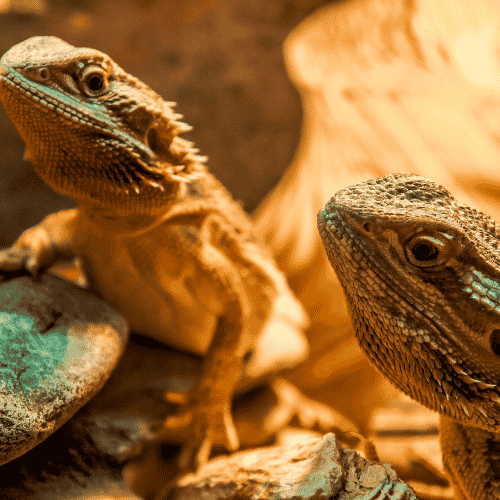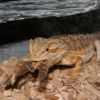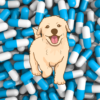Heavy breathing in bearded dragons is never a pleasant sight and is often a cause of anxiety among owners. There are numerous reasons why heavy breathing occurs, and while infections are often the main culprit, there are other factors to consider.

It’s rare for a bearded dragon to have any sort of respiratory infection (RI), but it does happen from time to time, often resulting from poor care and hygiene. In this article, we take a look at the common illnesses behind unnatural heavy breathing in bearded dragons, along with the treatment, and prevention methods for the same.
Why Is My Bearded Dragon Breathing Heavily?
- Dehydration – Heavy breathing can be a result of dehydration. If your bearded dragon is dehydrated, he may need to be treated with fluids under the supervision of a veterinarian.
- Upper Respiratory Infection – Heavy breathing is a common symptom of upper respiratory infections. This condition can be fatal if left untreated. Other symptoms of this condition include swelling in the eyes, along with trouble in eating and drinking.
- Heart Disease – The heart rate of a healthy bearded dragon should never exceed 80 beats per minute, so if you notice heavy breathing and the heart rate is above 80 beats per minute, you might have to take it to the vet as soon as possible.
Bearded Dragon Breathing Heavily in Bath
You probably know by now that your beardie isn’t that fond of baths, and the unusual breathing patterns during or after baths are often a result of the same, it is their way of showing discomfort. Heavy breathing during baths could also be owing to changes in water pressures and temperatures, neither of which is too concerning.

A common cause of respiratory infection among bearded dragons is the inhalation of water during baths, often unintentionally, which remains logged in them due to their lack of a diaphragm. The best way to deal with this is to have them sleep in a slightly inclined position to draw the water out of their lungs at night.
Bearded dragons have the tendency to drink water during baths, and unusual breathing patterns are also witnessed if they drink too much water. To avoid this, it’s best to keep them well hydrated before a bath, so that they don’t tend to open their mouths or have the inclination to drink the bathwater.
Bearded Dragon Respiratory Infection – A Complete Guide
Respiratory infections in bearded dragons are caused by bacteria, viruses, and fungi that affect the upper respiratory tract. Symptoms usually include loss of appetite, lethargy, and of course, heavy breathing, which points toward something more serious than a simple cold.
Identifying and understanding symptoms is a lot harder with bearded dragons than with other pets, owners will have to pay close attention to behaviors that they deem to be out of the ordinary. However, if you spot any of the following signs, it is more than likely that they are suffering from a respiratory infection,
- Wheezing or rattling sounds coming from your beardie’s lungs
- Excessive mucus production in the mouth
- Nasal discharge from one or both nostrils (mucus may appear yellowish)
- Head bobbing behavior and lethargy may also be present if there’s a fever present with this condition.
- Heavy breathing
- Eyes closed and drooping or partially closed
Treatments for Bearded Dragon Respiratory Infections
Bearded dragon respiratory infections are serious and should not be taken lightly. It is important to understand that the symptoms of respiratory infection may not always be obvious and in some cases, the symptoms may be mistaken for other illnesses.
In order to properly treat your bearded dragon for this disease, it is important that you visit an exotic animal veterinarian to receive a proper diagnosis and treatment plan.
In most cases, treating a bearded dragon for a respiratory infection requires antibiotics and antifungal treatments. These medications will help treat the underlying cause of the disease while also providing your pet with the necessary nutrients to help fight off the infection.
If left untreated with a respiratory infection, your beardie can become dehydrated very quickly which can lead to organ failure and even death. Because of this, it is important that you seek proper treatment right away if you notice any signs or symptoms of an upper respiratory tract infection in your bearded dragon lizard.
Preventing Respiratory Infections in Bearded Dragons
Check your enclosure for temperature and humidity. If you can use a hygrometer to check humidity, do so. Your enclosure should be at around 75% humidity and 80-90 °F.
Check to make sure your bearded dragon has enough water available. They need fresh water every day. If your bearded dragon is in a terrarium with other lizards or even other types of pets, it may have picked up a respiratory infection from them. Your bearded dragon’s cage should be kept clean and disinfected regularly.
Bearded dragons should also be allowed to take daily dust baths to help them shed their skin and keep their scales clean and healthy.
It is important that you have a cage set up for your bearded dragon that is big enough for him to move around in, but small enough so he will feel secure. Bearded dragons love climbing, so make sure that the sides of the tank are high enough so he doesn’t fall off.
Bearded dragons love hiding places, like branches or logs, where they can relax or sleep during the day. They also like climbing on rocks or branches where they can bask and warm up in the sun during the day. Keeping them happy and in a sterile environment will definitely help!
Can Bearded Dragons Eat Beet Greens?
Conclusion
Bearded dragons are one of the most popular exotic pets and for good reason. They’re friendly, quirky, and easy to care for. However, like any pet, they can get sick from time to time.
While a respiratory tract infection is not usually fatal, it can still cause a lot of discomforts. Luckily, a quick trip to the vet can help diagnose and treat this issue before it gets too serious.
There are also things you can do at home in the meantime: maintain an optimal habitat temperature range and use a nebulizer to humidify the air around your pet.

Doctor of Veterinary Medicine (D.V.M.) at Nation Taiwan University,Master of Science (M.S.) in Biomedical Engineering at National Taiwan University of Science and Technology




